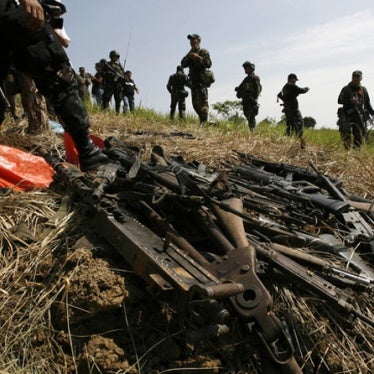(New York) - President Benigno Aquino III of the Philippines took office in June 2010 promising to promote justice for rights violations, but his government has taken insufficient steps to hold perpetrators of killings and other abuses accountable, Human Rights Watch said today in its World Report 2011.
The 649-page report, Human Rights Watch's 21st annual review of human rights practices around the globe, summarizes major human rights trends in more than 90 countries and territories worldwide. The Philippines, the report says, is a multiparty democracy with a thriving civil society and vibrant media, but law enforcement agencies and the justice system remain weak, and the military and police commit human rights violations with impunity.
Download the complete report > [PDF, 4 MB]
"President Aquino came to office promising that human rights would be a top priority," said Elaine Pearson, deputy Asia director at Human Rights Watch. "But talk is cheap, so long as security forces remain unaccountable for violent abuses."
Since Aquino took office, more than 20 leftist activists have been killed. No significant progress has been made in hundreds of political killings that have occurred over the past decade. An important exception is the trial of a former mayor, Andal Ampatuan, Jr., and 18 others linked to the Ampatuan ruling family for the November 23, 2009 massacre of 57 people, including 32 media workers, in Maguindanao on Mindanao island. The Justice Department has recently moved to increase the number of hearings per week and televise the trial, which began in September.
Aquino has not fulfilled his campaign promise to take action against other ruling families who use militias and police as their private armies. Investigations of the Ampatuan family following the Maguindanao massacre uncovered many years of impunity for horrific crimes, as well as huge caches of government-supplied weapons and ammunition, situations that may be replicated in many other provinces. Task forces were created to examine two private armies elsewhere in the country, but this has not resulted in any further action.
"The wheels of justice are slowly turning in the Maguindanao massacre trial," Pearson said. "But Aquino should take swift and strong action against the private armies of ruling families if the killings are ever going to stop."
Aquino's December order to drop charges against the so-called "Morong 43" sends a proper message to the military and police that mistreatment of suspected rebels undermines counterinsurgency efforts, Human Rights Watch said. In February 2010, the army and police arrested 43 men and women in Morong, Rizal province, and for 36 hours kept them blindfolded and refused them legal counsel. Following Aquino's order, 35 have been released. Three men who face separate criminal charges remain in jail while two men and three women who have admitted to being communist rebels and chosen to enroll in the government's integration program are still in military custody. But rather than investigating the allegations of abuse, the military granted awards to two officers who led the arrests.
Two new laws on torture and war crimes were enacted in late 2009 that will assist prosecutions of government officials implicated in criminal acts, Human Rights Watch said. However, no one has been successfully prosecuted under either of the acts, and the government has been slow to create the mechanisms to prevent torture required under the Anti-Torture Act.
"New laws on torture and war crimes provide valuable tools for combating abuses," Pearson said. "But real progress in professionalizing the army and police will only happen if these laws are put to use."







